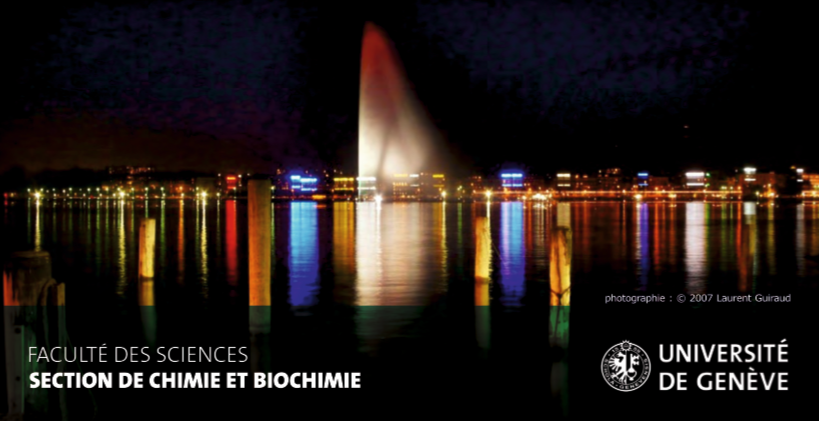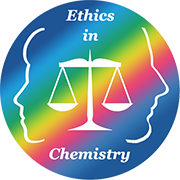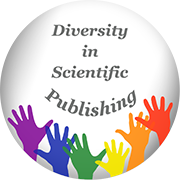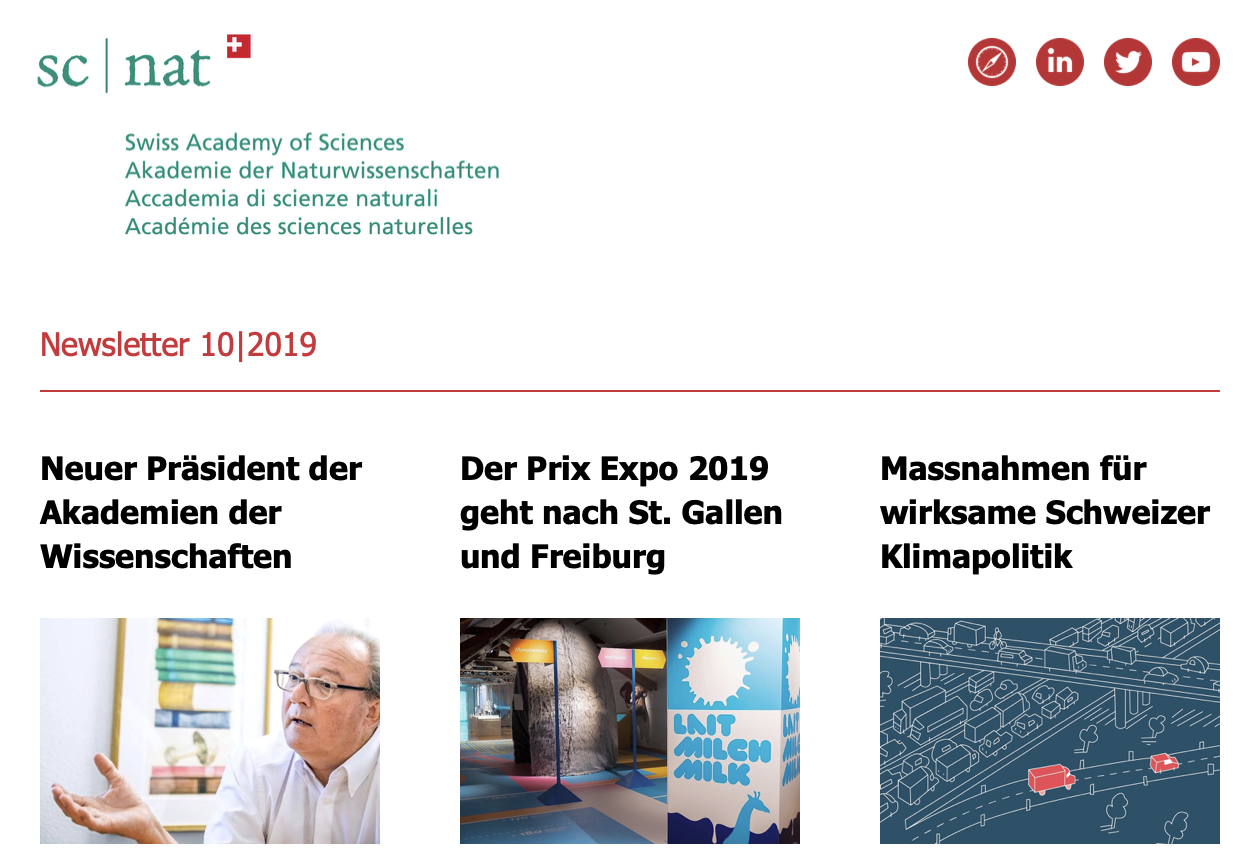Geneva Chemistry & Biochemistry Days 2020

16 January 2020, 09.00-17.30h
17 January 2020, 09.00-12.30h
Ecole de Physique - Grand Auditoire A - quai Ernest-Ansermet 24, Genève
Invited Speakers
- Prof. Harry L. Anderson - FRS
Oxford University, UK - Dr. Laurent Blanchoin
CEA - CNRS - INRA - Université Grenoble Alpes - Prof. Clémence Corminboeuf
Prix Jaubert Lecture 2020, EPFL Lausanne - Prof. Luke P. Lee
University of California, Berkley, US - Dr. Christophe Léger
Aix-Marseille University
Junior Speakers
- Alexander Aster
- Kenji Caprice
- Dalu Chang
- Ewa Drab
- Angelina Gigante
- Kristina Jajcevic
- Rania Kazan
- Lyudmil Raykov
- Clément Richard
- Chloé Roffay
- David Ruskic
- Biljana Stojimirovic
- Karolina Strakova
- Thomas Stricker
No registration required!

David Spichiger, SCS
03.01.2020
PhD/Postdoc Seminar: Patenting in Life Sciences & Chemistry
![]() A two-day hands-on workshop for doctoral students and post-docs in life sciences & chemistry.
A two-day hands-on workshop for doctoral students and post-docs in life sciences & chemistry.
11-12 June 2020
Centre Loewenberg, Murten
How does patenting in life sciences affect – my career? – academic research? – the society?
The course consists of a series of lectures (see "Meeting program") on intellectual property protection and patent law, challenges related to intellectual property in an academic environment and in a spin-off company and ethical considerations. You will also discover new job opportunities in the field of intellectual property management. Importantly, you will have the opportunity to participate in workshops where you can gain hands on experiences in the topics described.
The registration fee is 400 CHF per participant and includes:
- course registration, attendance & material
- catering (incl. BBQ) during the entire course time
- accommodation at Centre Loewenberg for the night 11-12 June 2020
Deadline: Please register from 3 January 2020 - 15 May 2020 via the website!
Website: https://scg.ch/scs-seminars/2020-2
With kind regards
Dr. Carolin von Schoultz, LS2 Scientific Officer
Dr. David Spichiger, SCS Scientific Officer
Prof. Heinz Mueller, Clinical Biochemistry, University of Basel & Swiss Federal Institute of Intellectual Property, Bern
David Spichiger, SCS
03.01.2020
Open Position: Science Officer (f/m) 50 - 60 % at SCNAT, Bern
The Swiss Academy of Sciences (SCNAT) reinforces the awareness of sciences as a central foundation for our cultural and economical development. Its wide establishment in the scientific environment enables the SCNAT to be an important and representative partner of the international scientific policy. The SCNAT networks sciences, makes its expertise available, promotes the dialogue between science and society and identifies and assesses the scientific progress to build and reinforce the working base of the next generation of scientists.
With immediate effect or by appointment, we are looking for a
Science Officer (f/m) 50 - 60 %
for the Science Division.
Your tasks
As a basis for a Swiss roadmap for cost-intensive research infrastructures, SCNAT is currently developing nationwide roadmaps for various scientific disciplines on the basis of a mandate from the State Secretariat for Education, Research and Innovation. The research communities are jointly responsible for these roadmaps. You shall support researchers from various disciplines in this work.
The tasks include:
- Support of several committees of researchers in the preparation of roadmaps (organisation; searching and writing of documents; keeping minutes).
- Coordination of planning, content and form of the products (texts) of the various committees.
- Writing or editing of texts (roadmaps or parts thereof) in English, independently or according to the responsible persons.
- Assignment and review of text layout.
- Support in the establishment of structures (e.g. round table discussions) that serve in the longer term to assess the needs of specific research infrastructures for the Swiss sciences.
Your profile
You are proactive, you have strong interpersonal skills and you are interested in establishing cooperative networks. Independent, well-structured and conceptual work is one of your strengths and you have organisational talent. You do not have difficulty in grasping facts of disciplines that do not correspond to your initial education and training. In addition to these skills, you have the following prerequisites
- Doctorate or comparable scientific education and training in either chemistry, biochemistry, biomedicine or molecular biology is required.
- Several years of professional experience in scientific research are expected, for example through working in national or international research projects or research networks at the operational level.
- Knowledge of large research infrastructures and/or knowledge of the requirements for processing large amounts of data (measurements, imaging methods, etc.) are an advantage.
- Excellent knowledge of the English language (oral and written), good knowledge of the German and/or French language (oral and written).
We offer
- A diversity of tasks that can be handled autonomously with creative freedom in a small, committed team.
- A job in an interesting environment in the immediate vicinity of the Bern railway station.
- Flexible working hours and progressive social benefits.
For the time being, the position is limited until the end of 2021, but continuation beyond this date is not ruled out.
Please send your complete application documents in English by January 8, 2020 to (only by e-mail with the subject "Application for Science Division", if possible in a single document). The interviews will take place on 15 and 16 January 2020, with a second interview on 22 January 2020.
For further information, please contact Dr. Marc Türler, Head of Platform Mathematics, Astronomy and Physics, tel. +41 31 306 93 65.
David Spichiger, SCS
29.12.2019
ChemPubSoc Europe Newsletter 20, December 2019

ChemPubSoc Europe is a society publishing group with a goal: wherever you are and whatever your background, we are striving to represent your high-quality research in our titles. This 20th newsletter brings you insights from the editorial offices; we outline the importance of ethical practices and diversity in chemical research and scientific dissemination.
The editorial offices are located in Weinheim at the foot of the beautiful Odenwald, near Heidelberg. We have a daily reminder of our responsibility to the planet and society—an imperative we share with many chemists. Thank you for collaborating with us during IYPT2019 to bring greater awareness to the wonders, as well as the challenges, of chemistry.
In the New Year, the 100th anniversary of macromolecular science will inspire a focus on polymers. And several journals celebrate birthdays: Chemistry–A European Journalturns 25 ChemPhysChem and ChemBioChem 20, and ChemistryViews will be 10. Read about the latest developments at ChemPubSoc Europe.
[Weinheim picture credits: 1 & 2 Sven Sasse–Rösch, 3 Mario Müller.]
 Ethical Awareness in Scientific Publishing
Ethical Awareness in Scientific Publishing
ChemPubSoc Europe adheres to the same ethical standards as the European Chemical Society (EuChemS) and its >160 thousand members: to publish accurate, honest, and representative accounts of original research. Unethical conduct in scholarly publishing undermines the scientific record and jeopardizes the future of chemical research and researchers. And yet, our editors and referees detect unethical practices regularly. Education and dialogue are needed to foster a community with a common ethical ethos. Please contact the editors if you have concerns about a paper.
Gender parity is important to ChemPubSoc Europe. Our editorial teams are representative of the diversity in research; they are a multinational group of men and women, including members of the LGBTQ community—all trained chemists with doctorates from leading institutes. It is our conviction that creative high-quality research stems from diversity and inclusivity, as well as experience in chemical research. Every skilled researcher should be able to reach their full potential. Our editors and societies advocate for better science through awareness and inclusion.
Strengthen your national society with high-quality submissions to ChemPubSoc Europe. Our editors look forward to working with you.
Visit ChemPubSoc Europe online and on Twitter. For regular updates subscribe to the ChemPubSoc Europe newsletter and the monthly newsletter published by the award-winning team at ChemViews Magazine. Contact ChemPubSoc Europe with your society news.
David Spichiger, SCS
19.12.2019
SCNAT Newsletter, Dezember 2019
Neuer Präsident der Akademien der Wissenschaften
Nach seiner Wahl zum Präsidenten der Jacobs University in Bremen übergibt Antonio Loprieno das Präsidium der Akademien der Wissenschaften Schweiz (a+) an SCNAT-Präsident Marcel Tanner. Weiter
Der Prix Expo 2019 geht nach St. Gallen und Freiburg
Die SCNAT zeichnet das Naturmuseum St. Gallen für sein langjähriges Engagement und das Naturhistorische Museum Freiburg für die Ausstellung «Milch – Mütterliches Elixier» aus. Weiter
Massnahmen für wirksame Schweizer Klimapolitik
Mit der Totalrevision des CO₂-Gesetzes stellt das Schweizer Parlament die Weichen für die Klima- und Energiepolitik. Zwei neue Faktenblätter beschreiben Instrumente für eine wirksame Klimapolitik. Weiter
Gründung der Jungen Akademie Schweiz
Die Akademien der Wissenschaften Schweiz gründen die Junge Akademie Schweiz und schliessen sich einem weltweit erfolgreichen Netzwerk an. Nachwuchsforschende erhalten die Möglichkeit, inter- und transdisziplinäre Projekte umzusetzen. Der Call für die ersten Mitglieder startet Mitte Dezember 2019 und dauert bis Ende Januar 2020. Weiter
2. Schweizer Landschaftskongress: Aufruf für Kongressbeiträge
Am 2. Schweizer Landschaftskongress vom 19. bis 20. Oktober 2020 in Lausanne geht es um Grenzen – im Raum und in den Köpfen. Unter dem Motto «Dialog über Grenzen hinweg» werden Grenzen überwunden und damit die Zusammenarbeit für die gemeinsame Weiterentwicklung der Landschaft angeregt. Für die Parallelveranstaltungen und den Markplatz gesucht sind strittige Beiträge von Tandems oder Kleingruppen aus Politik, Praxis, Forschung und Lehre, die Grenzen thematisieren oder grenzüberschreitend denken. Sind Sie ein eingespieltes Team oder unversöhnliche Gegnerinnen und Gegner? So reichen Sie ihren Vorschlag bis zum 31. Januar 2020 ein. Weitere Informationen
Neuer Leiter für das Forum Klima und globalen Wandel (ProClim)
Oliver Inderwildi übernimmt ab Februar 2020 die Leitung des Forums für Klima und globalen Wandel (ProClim) der SCNAT. Der theoretische Chemiker hat im Bereich Emissionsreduktion promoviert und Nachdiplome in Wirtschaft, Politik und BWL absolviert. Er forschte in Cambridge, Oxford und an der National University of Singapore. Seit zehn Jahren ist er in der wissenschaftlichen Politikberatung tätig. Er ist Autor und Herausgeber mehrerer Bücher und White Papers sowie eines Portfolios wissenschaftlicher Artikel im Bereich Emissionsreduktion und Klimawandel. Inderwildi tritt die Nachfolge von Karin Ammon an. Weiter
Plenum des Forums Landschaft, Alpen, Pärke ernannt
Das noch junge Forum Landschaft, Alpen, Pärke der SCNAT verfügt nun über ein Beratungsgremium, welches das Kuratorium beispielsweise in wissenschaftlichen, strategischen und politischen Fragen unterstützt. Es setzt sich aus Expertinnen und Experten aus allen Themenbereichen zusammen, die für das Forum von Bedeutung sind. Das Gremium nimmt seine Arbeit per Januar 2020 auf. Das Forum ist eine Plattform im Bereich der Landschafts-, Alpen- und Schutzgebietsforschung. Es fördert das Wissen über Landschaft und landschaftsverändernde Prozesse und setzt Forschungsresultate in Wert. Weiter
Die Gebirgswelt verändert sich
Invasive Arten und das Landschaftsmanagement alpiner Weiden beeinflussen die Lebensräume im Gebirge. Die Artenzusammensetzung in den Alpen ändert sich rasant. In der aktuellen Ausgabe des Magazins «Cratschla» beleuchten Expertinnen und Experten die ökologischen Prozesse in der Höhe und die Veränderungen in Zeiten des Klimawandels. Ein Artikel stellt zudem die Resultate eines Projekts zu Akzeptanz, Identifikation und Engagement in Biosphärenreservaten vor. Die Zeitschrift wird von der Forschungskommission des Schweizerischen Nationalparks und Biosphärenreservat Engiadina Val Müstair der SCNAT herausgegeben. Weiter
Neue Mitglieder der Nationalpark-Kommission
Das Uvek hat per 2020 fünf neue Mitglieder für die Eidgenössische Nationalpark-Kommission (ENPK) gewählt. Die beiden Sitze der SCNAT übernehmen Karin Ammon, stellvertretende Generalsekretärin der SCNAT, und Norman Backhaus, Präsident der Forschungskommission des Schweizerischen Nationalparks und Biosphärenreservat Engiadina Val Müstair. Sie ersetzen Jürg Pfister und Yves Gonseth. Die ENPK ist der Stiftungsrat der öffentlich-rechtlichen Stiftung Schweizerischer Nationalpark und wird vom Bundesrat gewählt. Als strategisches Organ nimmt die ENPK im Auftrag des Staates die Rechte und Pflichten aus dem Vertragswerk mit den Parkgemeinden wahr und wählt die Direktorin oder den Direktor sowie die Bereichsleitung. Wei
Was wird in Pärken von nationaler Bedeutung geforscht?
140 Interessierte haben an Tagung zur Forschung in Pärken von nationaler Bedeutung und Unesco-Welterbe-Stätten Ende Oktober 2019 teilgenommen. Die von «Parkforschung Schweiz» organisierte Veranstaltung zeigte auf, welche Forschungsthemen in Schweizer Pärken untersucht werden, reflektierte Ergebnisse und identifizierte Forschungslücken. Die Präsentationen zu Akzeptanz, sozialer Dimension, Biodiversität, Inwertsetzung und Gouvernanz sind jetzt online verfügbar. Weiter
Vorsicht giftig! Wie wir mit den Chemikalien auf der Welt umgehen
Bestimmt der gesetzliche Grenzwert die Gefährlichkeit von Giften? Oder doch die Dosis? Die aktuelle Ausgabe des Wissenschaftsmagazins «Horizonte» dreht sich um synthetische Stoffe, ihren Nutzen und den Argwohn gegen sie. Das Magazin zeigt auf, warum die unzähligen Studien zu synthetischen Molekülen deren Toxizität nicht genau bestimmen können. Es setzt Quecksilber, Asbest und Co. in Szene, denn was giftig ist, hat oft eine eigene Ästhetik. Und es erzählt die unendliche Geschichte des Glyphosats. Weiter
Akademie der Naturwissenschaften Schweiz (SCNAT)
Haus der Akademien | Laupenstrasse 7 | 3008 Bern
Andres Jordi | Telefon 031 306 93 23 |
Teilen auf Facebook und Twitter, an einen Freund weiterleiten
Page 52 of 299

 Season’s Greetings
Season’s Greetings Advocating for Diversity
Advocating for Diversity